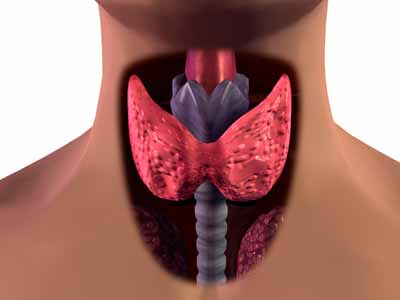
How the Thyroid Gland Regulates Metabolism
The thyroid gland, is the master gland of our body which, regulates our metabolism. The metabolism is the ability of our body to break down the food we eat and converting it to the energy we can use. The food we eat actually acts like a fuel for our body. This fuel is brunt at different paces by our bodied. Therefore, we have the terms fast metabolism and slow metabolism, for people who metabolize quickly and slowly, respectively. The thyroid gland maintains our metabolism through the activity of thyroid hormones. Iodine is taken up by the thyroid and incorporated into the thyroid hormones. The thyroid cells have the ability for both utilizing and absorbing the iodine. Otherwise, all other cells of our body are dependent on the thyroid gland for the regulation of their metabolism.
The thyroid gland is controlled by the hypothalamus and the pituitary gland. When the secretion of thyroid hormones is inadequate, the TRH (TSH releasing hormone) is secreted by the hypothalamus, which in turn stimulates our pituitary gland to release the TSH (Thyroid Stimulatory Hormone). Consequently, the thyroid produces increased hormones under the effect of TSH.
 Anatomy and Location
Anatomy and Location
The word thyroid is derived from a Greek word which means ‘shield’. It is a butterfly like gland which consists of two lobes, attached through a band like structure, known as the isthmus. The thyroid gland is located in front of our neck, just below the Adam’s apple.
Types of Thyroid Hormones
There are basically two main types of thyroid hormones, i.e. thyroxine (T4) and triiodothyronine (T3). If you have a normally functioning thyroid gland, it will produce 20% of T3 and 80% of T4 approximately. It also produces another hormone, called calcitonin, in smaller amounts. Calcitonin helps in regulating the calcium level in our blood.
Thyroid Disorder & Diseases
There are a number of thyroid disorder and diseases. These ailments can occur at any age and have a number of underline causes, for instance dietary deficiency, injury, tumor etc. But the following are the most common causes of thyroid disorders:
- Hypothyroidism and hyperthyroidism (too little or too much thyroid hormone respectively).
- Presence of lumps and nodules in the substance of thyroid gland.
- Abnormalities in the growth of thyroid gland.
- Thyroid neoplasia.
- Different kinds of thyroiditis, for example Hashimoto’s thyroiditis, De Quervain’s thyroiditis, silent thyroiditis etc.
Here are some details about commonly occurring thyroid diseases:
 Goiter: It is a swelling which forms in the region of our neck. A goiter associated with hyper active thyroid is called toxic. On the other hand, an endemic or simple goiter is a goiter caused by the deficiency of iodine and it is non-toxic in nature.
Goiter: It is a swelling which forms in the region of our neck. A goiter associated with hyper active thyroid is called toxic. On the other hand, an endemic or simple goiter is a goiter caused by the deficiency of iodine and it is non-toxic in nature.
Hyperthyroidism: A hyperactive thyroid produced by an access of thyroid hormones is related to hyperthyroidism. Its symptoms include increased motility of the bowel, nervousness, anxiety, intolerance to heat, weight loss, increase in appetite etc.
Hypothyroidism: This is just exact opposite to hyperthyroidism. There is decreased production of the thyroid hormones. In infants, this problem can lead to cretinism. Symptoms of hypothyroidism are intolerance to cold, constipation, sluggishness, slowed mentation, decreased appetite, weight gain etc.
TOP 5
THYROIDProducts |
|||||
| Thyraid | ThyroMend | Thyrene | SupraHealth | Blue Spring | |
|---|---|---|---|---|---|
| 1 | 2 | 3 | 4 | 5 | |
| Price (1 bottle) Price (6 bottles)best value |
$49.95 $139.80 |
$38.95 $233.70 |
$39.99 $159.96 |
$59.97 $323.84 |
$35.99 $194.35 |
| Overall Rating | 99.50% | 85.70% | 76.60% | 68% | 60.20% |
| Performance* |





|





|





|





|





|
| Speed of Results* | Extremely Fast | Good | Average | Average | Slow |
| Quality of Ingredients | Premium | Good | Good | Average | Average |
| Customer Satisfaction Evaluation | 99.20% | 84% | 74% | 68% | 60% |
| Safety Evaluation | Safe for Use | Safe for Use | Safe for Use | Safe for Use | Safe for Use |
| Customer Service Rating |





|





|





|





|





|
| Reorder Rate | Highest | Good | Good | Average | Average |
| Return Policy | Risk Free | Risk Free | Handling & Restocking Fee | Risk Free | Risk Free |
| Success Rate | 99.20% | 85% | 69.20% | 67.50% | 60% |

 Subscribe Now
Subscribe Now











